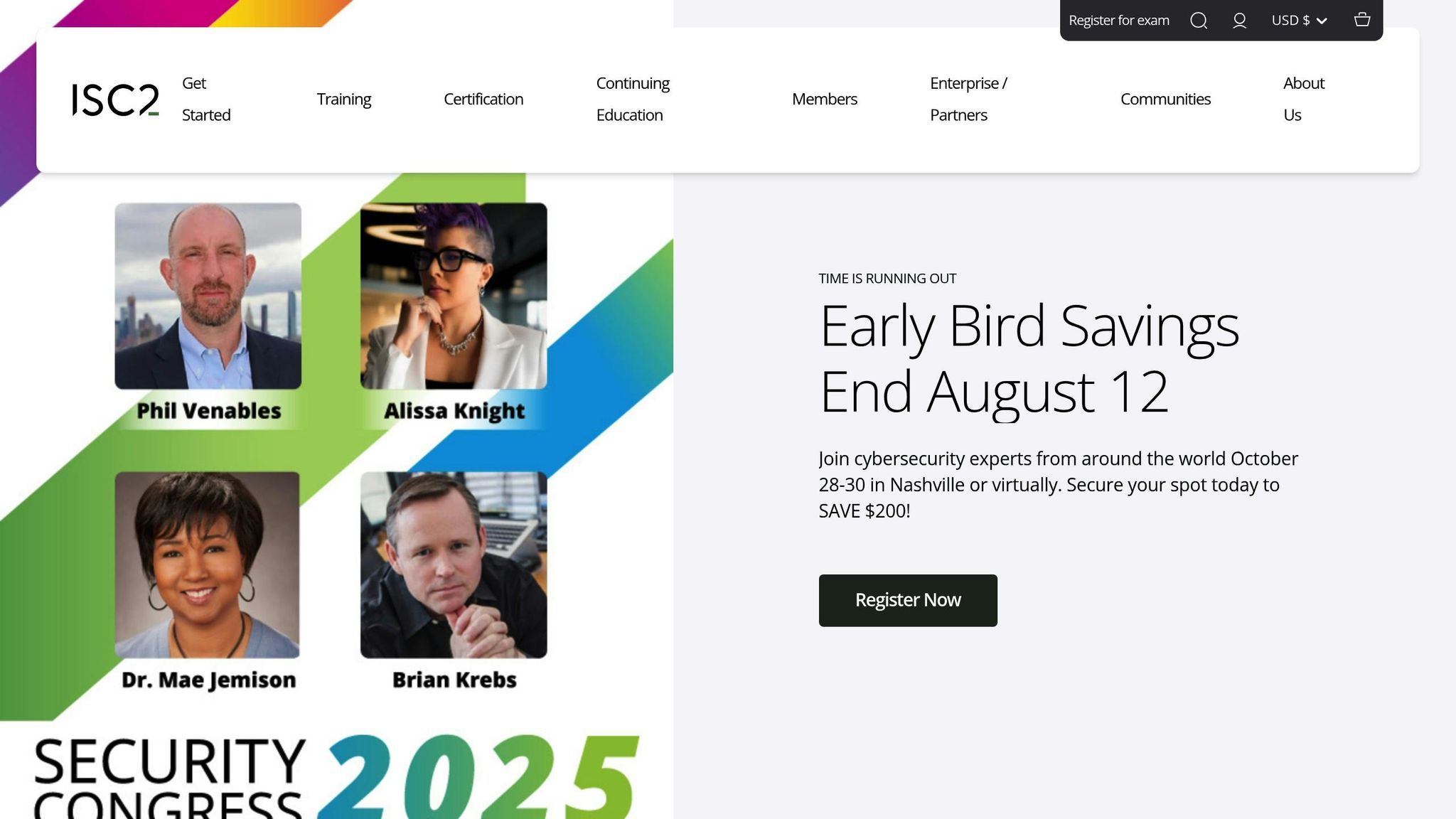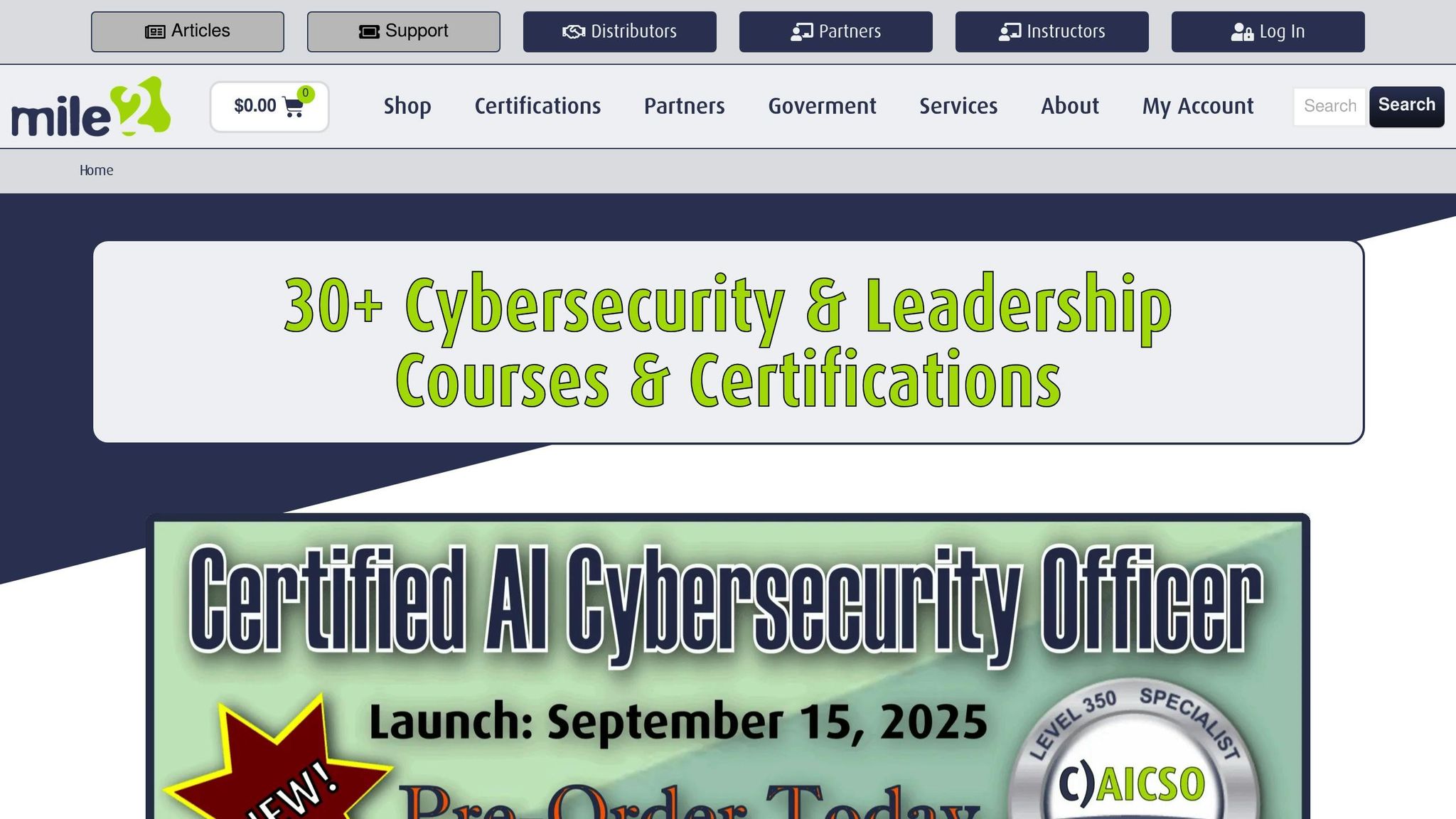Cloud security certifications can boost your career and salary. With cybersecurity jobs growing 267% faster than average and certifications increasing salaries by $18,000 on average, now is the time to invest in your skills. Certifications like CCSP, AWS Security – Specialty, and Google Professional Cloud Security Engineer validate expertise in securing cloud environments, which is critical as 83% of enterprise workloads now run in the cloud.
Key Points:
- Top Certifications: ISC2 CCSP, AWS Security – Specialty, Google Professional Cloud Security Engineer, CSA CCSK, Mile2 (C)CSO, Arcitura Certified Cloud Security Specialist.
- Salary Impact: Certified professionals earn $100,000–$160,000 annually, with some certifications offering even higher earning potential.
- Demand: 470,000 cybersecurity job openings in the U.S., with 70% of employers requiring certifications.
- Market Growth: Cybersecurity industry projected to reach $200 billion by 2028.
Each certification has unique strengths, prerequisites, and costs. For example, ISC2 CCSP is vendor-neutral but requires five years of experience, while AWS Security – Specialty focuses on AWS-specific security and costs $300. Choose based on your career goals, experience, and platform preference.
The Ultimate Cloud Security Certification Guide (UPDATED FOR 2025)
1. ISC2 Certified Cloud Security Professional (CCSP)

The ISC2 Certified Cloud Security Professional (CCSP) is a highly regarded credential in the cloud security field. It verifies expertise in securing cloud environments across major platforms, making it a sought-after qualification as organizations increasingly adopt cloud technologies. Here's a closer look at what the certification entails.
Core Focus Areas
The CCSP certification is built around six key domains of cloud security, ensuring candidates have a well-rounded understanding of the field. The exam evaluates knowledge in these areas:
| Domain | Weight | Focus Area |
|---|---|---|
| Cloud Concepts, Architecture and Design | 17% | Core cloud principles and secure architecture design |
| Cloud Data Security | 20% | Safeguarding data through encryption and privacy measures |
| Cloud Platform & Infrastructure Security | 17% | Securing cloud infrastructure and platforms |
| Cloud Application Security | 17% | Protecting applications and ensuring secure development practices |
| Cloud Security Operations | 16% | Monitoring, incident management, and operational security |
| Legal, Risk and Compliance | 13% | Navigating regulations and managing risks |
A strong emphasis on data security highlights the importance of protecting sensitive information in cloud environments.
Prerequisites
To earn the CCSP certification, candidates must meet specific experience requirements. This includes at least five years of paid, full-time work experience in IT, with three of those years in information security and at least one year in one or more CCSP domains. However, there are ways to reduce this requirement:
- A bachelor's or master's degree in computer science, IT, or a related field can count as one year of experience.
- Holding the Cloud Security Alliance's CCSK certificate can substitute for one year of domain-specific experience.
- An active CISSP credential can waive the entire experience requirement.
For individuals who don't yet meet these criteria, ISC2 offers the Associate of ISC2 designation. This allows candidates to take the exam and gain the necessary experience over the following six years.
Exam Details
The CCSP exam is designed to test comprehensive knowledge across the six domains. It's not just about memorizing facts - it requires a deep understanding of cloud security concepts and their practical applications.
Career Outcomes
Earning the CCSP certification can unlock several high-paying roles in cloud security. Some examples include:
- Security Architect: $155,306
- Security Engineer: $124,820
- Information Security Manager: $122,431
- IT Manager: $109,962
Additionally, the certification is recognized under DoD 8140, qualifying professionals for advanced and mid-level cybersecurity roles within the Department of Defense and organizations working on federal contracts.
This certification is ideal for IT leaders and security professionals involved in cloud security architecture, design, operations, and service orchestration. Typical roles include Cloud Architects, Engineers, Consultants, Administrators, and Security Analysts.
2. AWS Certified Security – Specialty
The AWS Certified Security – Specialty certification is a sought-after credential for professionals focused on cloud security. It validates your ability to design and implement advanced security solutions tailored to the AWS platform, making it a standout qualification for employers.
"AWS Certified Security - Specialty validates your expertise in creating and implementing security solutions in the AWS Cloud." - Amazon Web Services
Core Focus Areas
This certification focuses on five key domains, each addressing critical security challenges within AWS environments. The exam is structured to ensure candidates gain a balanced understanding across these areas.
| Domain | Percentage of Exam |
|---|---|
| Infrastructure Security | 26% |
| Data Protection | 21.5% |
| Logging and Monitoring | 20% |
| Identity and Access Management | 20% |
| Incident Response | 12.5% |
The certification delves into advanced topics like automation, threat detection, and compliance. Candidates must demonstrate proficiency with essential AWS tools and services such as Amazon EC2 Security Groups, AWS IAM, AWS Key Management Service (KMS), Amazon CloudWatch, AWS Config, Amazon S3 Object Locking, and AWS Systems Manager.
What makes this certification stand out is its emphasis on real-world decision-making. You'll be tested on your ability to strike the right balance between security, cost efficiency, and performance - skills that are crucial in enterprise settings.
Prerequisites
This is not an entry-level certification. Amazon recommends candidates have five years of IT security experience and at least two years of hands-on experience securing AWS environments.
Ideal candidates include seasoned IT professionals, developers, and system administrators with a solid grasp of security principles, risk management, compliance frameworks, and threat detection. It's particularly relevant for roles in cloud architecture, database management, networking, and DevSecOps.
Exam Details
The exam includes 65 questions, presented in multiple-choice or multiple-response formats, with a time limit of 170 minutes. The fee is $300 USD, and the certification remains valid for three years.
Expect challenging scenarios that test your ability to implement security controls, troubleshoot complex issues, and design automated security solutions. This exam requires a deep understanding of AWS security practices.
Career Outcomes
The demand for AWS security specialists is rising fast, with job listings increasing by 73% between October 2021 and September 2022.
Financially, the certification offers significant rewards. According to Certification Magazine's 2021 salary survey, professionals with this credential earn an average annual salary of $149,190 USD in the United States and $76,230 USD internationally. Salary ranges vary by experience:
- Entry-level specialists: $81,000–$100,000
- Mid-level specialists: $110,000–$150,000
- Senior specialists: Over $150,000
This certification opens doors to roles like AWS Security Specialist, Cloud Security Engineer, or AWS Solutions Architect with a security focus. It not only enhances your credibility but also positions you as a trusted advisor for stakeholders managing AWS environments.
For organizations deeply invested in AWS infrastructure, this certification often holds more value than vendor-neutral options. It demonstrates in-depth expertise that can directly improve security and compliance efforts. Up next, we’ll explore another certification pathway that builds on these specialized skills.
3. Google Professional Cloud Security Engineer
The Google Professional Cloud Security Engineer certification showcases expertise in creating, implementing, and managing secure environments within Google Cloud. It equips professionals to design infrastructures that are not only secure but also operationally efficient.
Core Focus Areas
This certification emphasizes applying security principles in practical, real-world scenarios. Candidates are expected to design architectures that align with business goals while effectively mitigating risks.
Prerequisites
To pursue this certification, candidates should have substantial hands-on experience. Google recommends at least three years in the field, with a minimum of one year working specifically with Google Cloud. Experience in deploying cloud environments and solutions is also crucial. This certification is particularly suited for security engineers, solutions architects, and IT professionals managing enterprise Google Cloud Platform (GCP) deployments.
Exam Details
The exam tests your ability to secure Google Cloud environments by tackling practical, scenario-based challenges. Expect to configure security policies and design architectures that balance technical needs with business objectives. This approach ensures candidates demonstrate both technical expertise and an understanding of business priorities.
Career Outcomes
Earning this certification can significantly boost your career prospects. In the U.S., certified professionals report an average salary of $194,238, while internationally, the average is $105,654. Additionally, 80% of Google Cloud learners experience faster promotions, and 85% say these certifications prepare them for high-demand roles. Employers value certified professionals for their ability to deliver secure solutions with a blend of technical precision and strategic insight.
4. CSA Certificate of Cloud Security Knowledge (CCSK)
The CSA Certificate of Cloud Security Knowledge (CCSK) is a well-regarded entry-level certification in cloud security. Created by the Cloud Security Alliance (CSA), this vendor-neutral credential sets the groundwork for understanding cloud security across various platforms and technologies.
Core Focus Areas
The CCSK certification spans 12 domains, covering both foundational and advanced topics. These include cloud concepts, application and data security, and incident response, along with newer areas like Zero Trust, Artificial Intelligence (AI) and Generative AI (GenAI), CI/CD pipelines, security operations, cloud telemetry, analytics, and data lakes. It also prioritizes key practices such as Identity and Access Management (IAM), data encryption, and Security as a Service (SecaaS). This comprehensive approach ensures candidates gain a broad understanding of traditional and emerging cloud security principles.
Prerequisites
The CCSK has no strict prerequisites, making it accessible to a wide audience. However, familiarity with IT security basics - like firewalls, encryption, secure development, and identity management - can be helpful. It’s often seen as a stepping stone to advanced certifications like CCM and STAR, and it can even count as one year of cloud security experience for the CCSP certification.
Exam Details
The CCSK v5 exam consists of 60 multiple-choice questions, and candidates have 2 hours to complete it. It’s an open-book test, allowing reference materials, but achieving a passing score of 80% requires thorough preparation. The current passing rate for the exam is 62%. The exam fee is $445 for two attempts as of January 2025. The test is based on the CCSK Study Guide, focusing on practical knowledge rather than the broader CSA Guidance document. This ensures that certified individuals are equipped with actionable cloud security skills.
Career Outcomes
Professionals with a CCSK certification earn an average salary of $121,932 annually in the U.S.. The certification validates key cloud security expertise, making it valuable for roles like Cloud Administrator, Cloud Architect, Security Engineer, Enterprise Architect, and Security Architect. With nearly 60% of cybersecurity jobs favoring certifications, the CCSK provides a strong competitive advantage in the job market. It’s especially beneficial for those aiming for leadership positions in cloud security and governance, and it serves as a great foundation for pursuing more advanced certifications.
sbb-itb-97f6a47
5. Mile2 Certified Cloud Security Officer (C)CSO

The Mile2 Certified Cloud Security Officer (C)CSO certification stands out by blending in-depth theoretical knowledge with hands-on lab exercises. Unlike certifications that lean heavily on concepts, the Mile2 (C)CSO emphasizes real-world application, preparing professionals to tackle the complexities of cloud security head-on. By building on foundational certifications, it shifts the focus toward practical challenges in cloud environments.
Core Focus Areas
This certification covers a wide array of cloud security topics, such as:
- Cloud computing and architecture
- Cloud security risks
- Enterprise risk management and governance
- Legal considerations
- Virtualization
- Data security and data center operations
- Interoperability and portability
- Traditional security principles
- Business continuity and disaster recovery
- Incident response
- Application security
- Encryption and key management
- Identity, entitlement, and access management
What sets this certification apart is its hands-on lab exercises. These labs simulate real-world scenarios, including cloud migration assessments, SLA compliance checks, virtualization strategies, network traffic analysis, virtual machine hardening, ESXi and vCenter security, and Azure data protection. This approach ensures candidates can immediately apply their skills in professional settings.
Prerequisites
To qualify, candidates need at least 12 months of experience in virtualization or equivalent expertise. A solid grasp of cloud architectures and at least a year of experience in general security practices are also recommended.
Exam Details
The exam combines theoretical knowledge with practical simulations, reflecting the certification's focus on real-world readiness. Designed for professionals managing diverse cloud security environments, the test evaluates both understanding and application through integrated assessments.
Career Outcomes
This certification is ideal for professionals like virtualization administrators, cloud administrators, Chief Information Officers, and cloud auditors or compliance officers. It's also a great fit for anyone looking to deepen their knowledge of cloud security. With its focus on private cloud architectures and multi-vendor solutions, it’s particularly beneficial for organizations handling complex cloud environments.
6. Arcitura Certified Cloud Security Specialist

The Arcitura Certified Cloud Security Specialist certification provides a thorough understanding of the key principles needed to protect cloud-based assets. A major focus is the shared responsibility model, which outlines the roles of cloud service providers in securing infrastructure and the responsibilities of customers in safeguarding data, applications, and access points.
Core Focus Areas
The certification program dives into critical areas such as access management, data governance, compliance, and disaster recovery. It also addresses common risks like limited visibility, misconfigurations, fluctuating workloads, and gaps in compliance.
Prerequisites
There are two pathways to earning this certification. The first involves completing a comprehensive exam that covers all five modules (CCP Modules 1, 2, 7, 8, and 9), with no prior certification required. The second pathway is a partial exam, which is available to individuals who have already achieved the Cloud Professional Certification. This option focuses on advanced topics from Modules 7, 8, and 9.
Exam Details
The full exam evaluates knowledge across all five modules, and successful candidates receive digital certificates and badges for both the Cloud Professional and Cloud Security Specialist tracks. For those taking the partial exam, the focus is on advanced material from the final three modules. Both formats assess expertise in identifying security threats, implementing controls, and using technologies to secure cloud platforms, services, and infrastructure.
Career Outcomes
This certification equips professionals for roles that support cloud migration efforts. With a global cybersecurity workforce shortage - estimated to require a 65% increase to meet demand - certified specialists are well-positioned for roles such as Cloud Security Architect, Engineer, or Compliance Specialist. In the U.S., median salaries for these positions hover around $130,000, with top-tier roles exceeding $200,000. Beyond boosting employability, this credential paves the way for career growth as professionals stay ahead of evolving cloud security challenges. As organizations ramp up their migration to the cloud, this certification becomes increasingly valuable in shaping successful careers in cloud security.
Advantages and Disadvantages
Choosing the right cloud security certification involves weighing the benefits and challenges of each option against your career objectives, budget, and available time.
| Certification | Advantages | Disadvantages |
|---|---|---|
| ISC2 CCSP | • High earning potential with an average salary of $171,524 • Vendor-neutral, applicable across all cloud platforms • Approved for U.S. government contracting roles • Strong industry recognition |
• High cost: $599 exam fee plus training expenses ranging from $963.75 to $1,562.75 • Requires 5 years of IT experience, including 3 years in security • Annual renewal fees of $125 |
| AWS Certified Security – Specialty | • Highest earning potential with an average salary of $203,597 and a 10% pay premium • Relatively affordable exam fee of $300 • AWS dominates with a 30% market share • Preparation course available for $29/month |
• Vendor-specific, limiting cross-platform flexibility • Requires prior AWS knowledge and experience • Continuing education needed for maintenance |
| Google Professional Cloud Security Engineer | • Affordable exam fee of $200 • Growing demand as Google Cloud gains traction • Focuses on practical, hands-on security skills • No formal experience prerequisites |
• Smaller market share compared to AWS • Limited salary data available • Vendor-specific knowledge may not translate to other platforms |
| CSA CCSK | • Vendor-neutral, applicable to diverse cloud environments • Comprehensive coverage of cloud security basics • Flexible, self-paced study options • Recognized as a baseline industry certification |
• Higher cost with a $599 exam fee • Less recognition compared to major vendor certifications • May require additional certifications for career advancement |
The decision comes down to balancing financial investment, time commitment, and professional experience requirements. For instance, the AWS Certified Security – Specialty certification costs $300, while the ISC2 CCSP can total up to $2,162.75 when factoring in training fees.
Preparation timelines also vary. Vendor-specific certifications like AWS or Google typically take a few months to prepare for, while broader certifications like CCSP may require more extensive study. According to a recent ISC² survey, 70% of employers now demand certifications, emphasizing the need to allocate sufficient time for preparation.
Experience requirements also differ. The CCSP mandates five years of IT experience (three in security), which may not suit newcomers. On the other hand, certifications like Google Professional Cloud Security Engineer and CSA CCSK are more accessible, as they don’t require formal experience.
On average, cybersecurity certifications in the U.S. lead to an $18,000 salary boost. However, it’s essential to factor in ongoing renewal fees, which can range from $45 to $125 annually.
Ultimately, your choice depends on your career goals. Vendor-neutral certifications like CCSP and CCSK offer flexibility across various platforms, while vendor-specific ones, such as AWS or Google, provide specialized expertise that can secure higher salaries in organizations heavily invested in those ecosystems.
One final tip: Many employers offer financial support for certification costs. Check if your company provides such benefits - it could significantly ease the financial burden and demonstrate their commitment to your professional growth.
Conclusion
Cloud security certifications offer various paths to grow your career, with each option catering to different goals and levels of expertise. Considering that 89% of enterprises now depend on cloud services and global cloud security spending is expected to hit $6.6 billion by 2029, the demand for skilled professionals in this area is strong.
When deciding on a certification, think about factors like platform focus, career stage, and financial investment. Vendor-specific certifications, such as the AWS Certified Security – Specialty ($300) and the Google Professional Cloud Security Engineer ($200), are tailored to specific platforms and can be a great fit for certain roles.
For broader, platform-agnostic credentials, certifications like the CCSP and CCSK stand out. The CCSP, often considered the benchmark for experienced professionals, is ideal for IT and security leaders aiming to demonstrate their expertise in protecting cloud environments. As (ISC)² explains, it’s best suited for those with five years of experience, given its $599 exam fee and its in-depth focus on cloud security principles. On the other hand, the CCSK offers a more affordable option at $395, providing foundational knowledge applicable across multiple cloud platforms.
Cost is another important consideration. Interestingly, 40% of cybersecurity professionals report that their employers cover the cost of certifications. Additionally, certifications can lead to higher salaries, with certified professionals earning an average of 10–20% more than their uncertified peers. In the U.S., this often translates to a salary boost of about $18,000.
Current market trends also highlight the importance of aligning certifications with industry needs. Major cloud providers like AWS, Microsoft Azure, and Google Cloud dominate 66% of cloud spending, making vendor-specific certifications particularly valuable. Reviewing job postings can help you identify which certifications are in demand. With 72% of companies expected to prioritize candidates with recognized certifications by 2025 and security-related roles projected to grow by 31% through 2029, strategic certification choices can have a lasting impact on your career.
For businesses seeking expert advice on implementing cloud security or choosing certifications, the Top Consulting Firms Directory is a helpful resource to connect with IT and digital transformation specialists.
FAQs
What should I consider when deciding between vendor-specific and vendor-neutral cloud security certifications?
When choosing between vendor-specific and vendor-neutral cloud security certifications, it’s important to align your decision with your career aspirations and what the job market demands.
Vendor-specific certifications are tailored to a particular vendor’s tools and technologies. If you plan to work heavily within a specific cloud ecosystem - like AWS, Microsoft Azure, or Google Cloud - these certifications can highlight your expertise in that platform. However, they might limit your flexibility if you decide to transition to a different platform later.
In contrast, vendor-neutral certifications offer a broader understanding of cloud security principles that apply across multiple platforms. This versatility makes them appealing for roles that require cross-platform knowledge or strategic decision-making, reducing the risk of being tied to a single vendor.
When deciding, think about factors like how relevant the certification is to the roles you’re targeting, the costs involved, and whether it supports your long-term career flexibility. Vendor-specific certifications often come with higher costs and narrower applicability, while vendor-neutral certifications tend to provide more adaptable career options.
What are the experience requirements for advanced cloud security certifications like CCSP and AWS Security – Specialty, and how do they affect beginners?
Advanced cloud security certifications, such as CCSP and AWS Security – Specialty, often demand several years of hands-on professional experience, which can make them tough for newcomers to tackle right away. For instance, earning the CCSP requires a minimum of five years of full-time IT experience, including three years specifically in security. Similarly, AWS Security – Specialty suggests having five years of IT experience, with at least two of those years dedicated to working in cloud environments.
If you're just beginning your journey in cloud security, starting with entry-level certifications might be a smarter move. Options like Cloud Practitioner, CCSK, or CompTIA Cloud+ are designed to build a strong foundation without needing extensive prior experience. These certifications serve as an excellent starting point, helping you prepare for more advanced qualifications down the road.
What are the career advantages of earning a cloud security certification, including job prospects and salary growth?
Earning a cloud security certification can give your career a serious boost, opening up opportunities for in-demand roles and significantly increasing your earning potential. For instance, professionals holding the Certified Cloud Security Professional (CCSP) credential typically earn an average salary of about $148,200 in the U.S. Positions such as Cloud Security Engineer and Cloud Architect also offer impressive pay, often exceeding $135,000 annually.
Beyond higher paychecks, these certifications strengthen your qualifications for leadership roles and provide added job stability in a fast-growing industry. With the cloud security sector experiencing a 32% job growth rate, certified professionals frequently report annual salary bumps of $20,000 or more. If you're looking to advance in tech, investing in a cloud security certification could be a game-changer.


